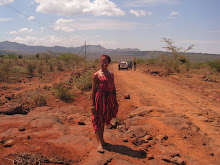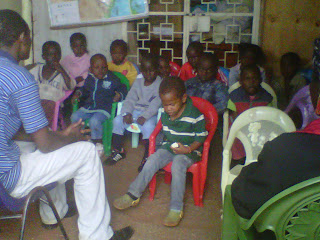"As a person dances so the drums are beaten for them"
- An Igbo Proverb
- An Igbo Proverb
 |
| Happy 31st Birthday to Me! Photo taken by my 4 year old son |
A friend of mine once told me, "Joanne, you're a different bird. You're the type who wears mismatched socks." I smiled and scrunched up my toes underneath the kitchen table on the cold tile floor. Little did he realise that on my right foot was a pink tie-dye sock and on my other right foot was a blue sock. Wearing mismatched socks for me has always brought a smile to my face reminding me how futile our efforts as adults are to make sure that we "have everything together." Life is a dance. Why not make it a colourful one?
Back in 2007, when my family and I had just returned to Bermuda from Jerusalem I had this to say about dancing:
Learning to dance with tired feet
Treasured words rarely spoken
Hopeful dreams gently felt
Learning again my heart to open
- Joanne Ball-Burgess April 2007
"Right now I am ready for a change of pace whether that may be to obtain my Master's degree, get a teaching job or to start thinking about child number three (Don't worry guys, I'm not pregnant!) During this past month I've felt that my feet are just about to leave
the diving board..."
- My journal entry from April 2008
the diving board..."
- My journal entry from April 2008
Without looking back my feet soared from life's diving board into the waters named 'Unknown'. As I emerged splashes that sounded like the daydreams of a little girl echoed in my head. The thousands of microscopic water droplets flew up into the air as shapeless liquid and landed on earth as tangible forms: published books, composed songs, smiling school children and new hopes for a new generation of writers.
Two years later my feet were no longer tired but someone had put the song on repeat for way too long...
"The dance is monotones but my feet are still moving…existing I smile as I secretly stumble onto the stage (I hope that no one saw me trip)"
- Joanne Ball-Burgess October 3, 2010
It was time to leave Bermuda... my ears were now tired from hearing the same song; "Change, change it will never come. Life on the Rock is how it's always been done"- The Lizard & the Rock. So once again my feet began to jig and I did the gombey dance all the way to Nairobi.
Nowadays my feet are still moving and so is the ground beneath it. Life feels dynamic and once again I am standing on the edge of the metaphoric diving board. So one Friday I was shocked to open The Standard Newspaper to see this:
 |
| The Pulse is featured in the Standard Newspaper. It has has information on Nairobi fashion (think Saved by the Bell in 2012) and has tabloid tendencies |
 |
| WTH? I guess that's the price for dancing to your own drum beat |
Can someone please explain the jokes in these captions? I don't get it. I know that my friends and I had a great time at the Drum Jam Festival. When we arrived we were surprised to see everyone sitting and clapping like Brits at an opera while passionate drummers gave all they had on stage. I figured that the drums were playing just for me and so I did what came natural and didn't pay attention to the lurking photographers. In the background my children were playing and watching their mother act like a teenager.
Speaking of dance, I'm learning some of the traditional tribal dances this year. I guess it is possible to dance to the beat of your own drum while simultaneously learning a new dance:) I'll keep you posted on my progress.
In the meantime;
I hope you never lose your sense of wonder
You get your fill to eat but always keep that hunger
May you never take one single breath for granted
God forbid love ever leave you empty-handed
I hope you still feel small when you stand beside the ocean
Whenever one door closes I hope one more opens
Promise me that you'll give faith a fighting chance
And when you get the choice to sit it out or dance
I hope you dance
- Mark D. Sanders and Tia Sillers
R.I.P. Whitney Houston. Dance on in another place.












































